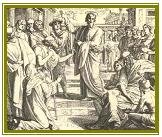It doesn’t take too many clicks of your television remote, or even a trip through a grocery store checkout aisle to be convinced that we live in a time of “spiritual” exploration. In many respects, not unlike that of the pagan world of Greece when Paul preached in Athens. It was here that Paul became quite candid and outspoken over the worship of idols. It was the custom then, in Athens, for the philosophers of the time to gather at an arena near Areopagus – or Mars Hill -- for debate over philosophies and ideas. Acts 17:21 records Luke’s observations: “Now all the Athenians and the strangers visiting there used to spend their time in nothing other than telling or hearing something new.” The Greeks would like to have us think that they were seeking truth through their debate, but very much like today, “spirituality” was to great extent nothing more that a consumer item. A fad. Like Americans, the Greeks had a great attraction to novelty.
In that regard Paul found himself in a situation very much unlike any today. Rather than the message of Jesus being rejected because it was something people thought they had already heard, the Gospel was exciting to the Greeks because it was something “new.” Isn’t it interesting that Christianity is rejected so frequently in today’s society because people think they already know everything about it -- when in reality they don't have a clue? Well, in Paul's case, the Gospel was heard! The people of Athens recognized that this “philosophy” was something new and fresh. Something they did not know. But, oddly, Paul spoke to them as if they did in fact already know it. Paul stood in the midst of the Areopagus and said, “I perceive that in all things you are very religious; for as I was passing through and considering the objects of your worship, I found an altar with this inscription: ‘TO THE UNKNOWN GOD.’ Therefore, the One whom you worship without knowing, Him I proclaim to you.” (Acts 17:22-23)
Paul began by directing their thoughts "to the unknown god" by speaking of the God the Creator: “God, who made the world and everything in it, seeing He is Lord of heaven and earth, does not dwell in temples made with hands. Nor is He worshipped with men’s hands, as though He needed anything, seeing He gives to all life, breath, and all things.” Well, the philosophers – being pagan philosophers – rejected it. They laughed Paul off Mars Hill. They especially didn’t buy the whole resurrection part!
Throughout history, peoples of all cultures and all religious beliefs have known something of God in the wonders of creation. They know God the Creator through his works and the sense of awe of His Creation. Paul wrote in Romans 1:19-20, “…what may be known of God is manifest in man for God has shown it to them for since the creation of the world His invisible attributes are clearly seen being understood by the things that are made even His eternal power in Godhead so that they are without excuse.”(Romans 1:19-20) Sad part is, like the philosophers at Areopagus, people are still rejecting Him and laughing. What do you think? Is He the unknown God? “He was in the world, and the world came into being through Him; yet the world did not knowHim.” (John 1:10)
In that regard Paul found himself in a situation very much unlike any today. Rather than the message of Jesus being rejected because it was something people thought they had already heard, the Gospel was exciting to the Greeks because it was something “new.” Isn’t it interesting that Christianity is rejected so frequently in today’s society because people think they already know everything about it -- when in reality they don't have a clue? Well, in Paul's case, the Gospel was heard! The people of Athens recognized that this “philosophy” was something new and fresh. Something they did not know. But, oddly, Paul spoke to them as if they did in fact already know it. Paul stood in the midst of the Areopagus and said, “I perceive that in all things you are very religious; for as I was passing through and considering the objects of your worship, I found an altar with this inscription: ‘TO THE UNKNOWN GOD.’ Therefore, the One whom you worship without knowing, Him I proclaim to you.” (Acts 17:22-23)
Paul began by directing their thoughts "to the unknown god" by speaking of the God the Creator: “God, who made the world and everything in it, seeing He is Lord of heaven and earth, does not dwell in temples made with hands. Nor is He worshipped with men’s hands, as though He needed anything, seeing He gives to all life, breath, and all things.” Well, the philosophers – being pagan philosophers – rejected it. They laughed Paul off Mars Hill. They especially didn’t buy the whole resurrection part!
Throughout history, peoples of all cultures and all religious beliefs have known something of God in the wonders of creation. They know God the Creator through his works and the sense of awe of His Creation. Paul wrote in Romans 1:19-20, “…what may be known of God is manifest in man for God has shown it to them for since the creation of the world His invisible attributes are clearly seen being understood by the things that are made even His eternal power in Godhead so that they are without excuse.”(Romans 1:19-20) Sad part is, like the philosophers at Areopagus, people are still rejecting Him and laughing. What do you think? Is He the unknown God? “He was in the world, and the world came into being through Him; yet the world did not knowHim.” (John 1:10)
- Pastor Mark


No comments:
Post a Comment